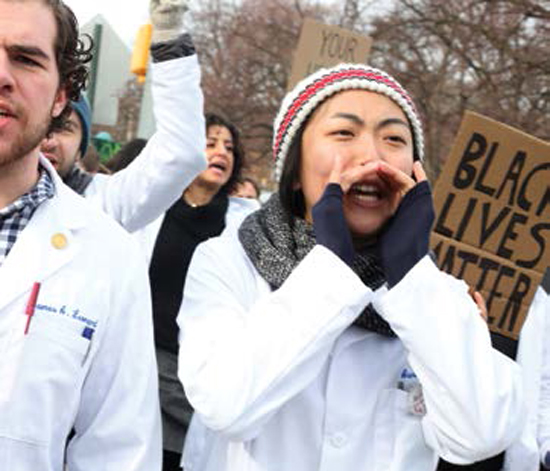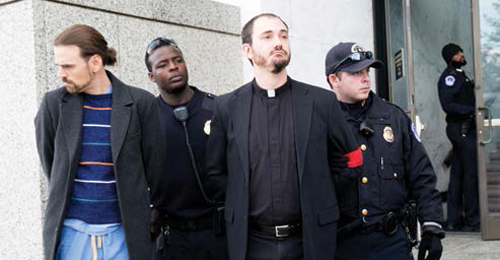Care Not Chaos
March 21, 2017

1199SEIU members, together with community allies, faith groups, elected officials and sisters and brothers from unions across the country are on the front lines of the fight to protect the country’s healthcare system. In every region, Union members have demonstrated, marched, lobbied, and even engaged in nonviolent civil disobedience to send the message that the Affordable Care Act (ACA) cannot be repealed without a better replacement and that our healthcare institutions—particularly those that serve our most needy communities— must have adequate funding.
“I know firsthand that quality health care and affordable health insurance save lives,” affirmed Boston Med. Ctr. 1199 member Latia Jones at Jan. 12 press conference. “We need to care for the people who need it most – not have chaos in our healthcare system.” Massachusetts Region members joined allies from Healthcare for All and The Boston Interfaith Organization at the event.
"BECAUSE OF THE ACA, I’M ABLE TO KEEP MY DAUGHTER ON MY INSURANCE PLAN AND GET HER THE CARE SHE NEEDS. I AM VERY WORRIED ABOUT WHAT WILL HAPPEN IF SHE LOSES HER HEALTH COVERAGE BECAUSE WE DON’T HAVE ANY OTHER OPTIONS FINANCIALLY"
- Pat Matthews CNA, Newark, NJ.
Repeal of the ACA was a central plank of President Trump’s campaign; within hours of his inauguration he signed an executive order that signaled the immediacy of his administration’s intent to dismantle the law. Eliminating the ACA without a comparable replacement puts at risk some 30 million people who became insured under the law. It would end hard-won requirements for equal coverage for women, protection for those with preexisting conditions and allowances for young people to stay on their parents’ insurance.
“Before the ACA, there were hundreds of people who couldn’t do anything for themselves, and now we see them taking care of themselves,” says Andrea Jenkins, a medical assistant at Medisys Jamaica in Queens, NY, emphasizing the gravity of losing the ACA. “My concern is that now they will die in their homes.”
Right-wing Congressional leaders promise after the ACA’s repeal they’ll pass a new healthcare bill—one that doesn’t yet exist. This isn’t lost on the public, and Congresspeople and Senators have been dogged by the cry of “show us your plan” to continue protecting those who gained coverage under the ACA. The numbers speak for themselves: 2.2 million Floridians could lose healthcare; in New York State 2.7 million people are at risk. Statistics are comparable nationwide. At demonstrations of every size, including one in Philadelphia on Jan. 26 that drew thousands of protesters, people are pressuring lawmakers to come up with a replacement for the ACA before rushing to repeal.
|
|
| Rev. John Edgerton of Boston’s Old South Church was among those arrested at the nonviolent civil disobedience action in Washington, D.C. Jan.31. Faith leaders have been strong allies in the fight for a sensible replacement for the ACA. |
“My 19-year-old daughter has a medical condition that puts her at high-risk of developing glaucoma, so it’s very important that she gets routine check-ups,” said Pat Matthews, a CNA at Forest Hills Healthcare Center in Newark, NJ. “Because of the ACA, I’m able to keep her on my insurance plan and get her the care she needs. I am very worried about what will happen if she loses her health coverage because we don’t have any other options financially.”
Secondary to the ACA repeal, but at the forefront of the fight for healthcare and the survival of institutions that provide it, is the battle to preserve Medicaid funding. In many states Medicaid was expanded as part of ACA implementation. The vital program has long been in the crosshairs of many on Capitol Hill, including House Speaker Rep. Paul Ryan, who now see their chance to replace the current cost-sharing program with fixed-amount block grants. Block grants are designed to cut over $1 trillion from existing Medicaid spending over 10 years.
The inflexible disbursements leave states responsible for unexpected healthcare costs, like epidemics or new illnesses—as was the case with AIDS and Zika—and spikes in enrollment because of aging populations or economic downturns. The current proposal would likely give states broad new authority over eligibility requirements, make enrollment more difficult and lead to draconian budget cuts that will impact services for children, senior citizens, the poor and healthcare institutions in just about every sector. Long-term care is particularly vulnerable; the vast majority of nursing home residents depend on Medicaid. “We are very scared about the Medicaid block grant,” says Michelle Ned, an in-service patient coordinator at Brooklyn’s Interfaith Medical Center. Interfaith serves a low-income community that depends heavily on Medicaid funding.
“If they take away Medicaid our community residents will die,” she says. “They will be scared of out of pocket costs and will stay home when they are sick instead of coming to the hospital.”


